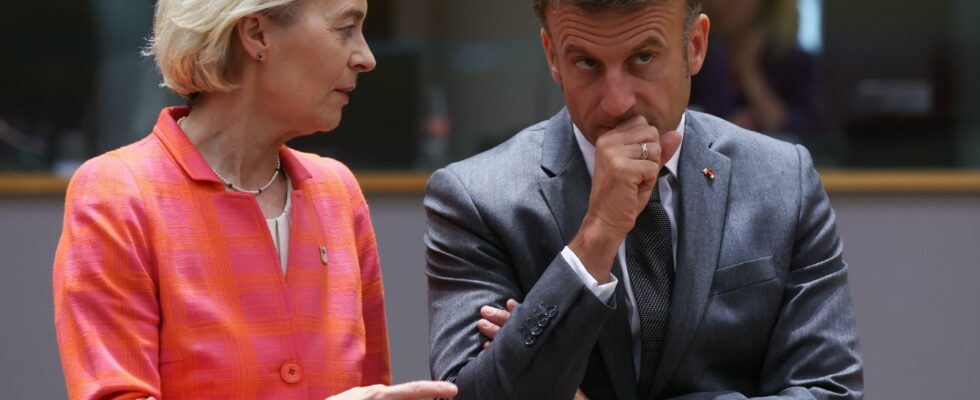There is no doubt that the next executive will immediately discover on his desk a pile of files that would scare more than one person. And the longer the appointment of a Prime Minister is delayed, the narrower the window of opportunity to complete some of them will be. Among the most urgent, the budget, of course, whose deadline for submission to Parliament is set for October 1st. For this first test by fire, Bercy has prepared a proposed text, the final decisions of which have been approved by Matignon, and which provides for a freeze on spending. Ceiling letters – which set a maximum amount of credits granted – were sent to ministries this summer. According to The Worldthat of Labor would see its expenses reduced by 3 billion euros, while Culture, Sport and Defense would be spared. Gabriel Attal’s successor will nevertheless have plenty of time to amend this version.
Another major deadline is likely to give the future government a hard time. By September 20, France must submit its medium-term budgetary and structural plan to the European Commission. This is a new development following the reform of the Stability and Growth Pact – the budgetary rules in force in the EU – voted on in April by MEPs. Over a period of four or seven years, each Member State must present a trajectory for restoring its public accounts, as well as a series of reforms and investments to support its growth. Brussels will then be able to validate or not the document and make its own recommendations. The objective for France: to return to below 3% of public deficit, compared to 5.1% estimated for 2024.
A copy to complete
The Treasury has been in tight negotiations with the European Commission for several months now. At the heart of the discussions: the possibility for France to build on the reforms and investments already undertaken. “The hard wing of the Commission wanted these elements not to be taken into account and for only new proposals to be integrated into the plan. But the Treasury defended its position,” says an advisor to the outgoing Prime Minister. Paris won its case. The France 2030 plan [NDLR : un programme d’investissement de 54 milliards d’euros dans l’industrie, la transition écologique, les nouvelles technologies] will, for example, be taken into consideration.
“A first document, which highlights the reforms already implemented, explaining their beneficial effects, is ready. As for the second part, on future reforms, it is up to the next government to concoct it,” the advisor continues. To get into working order, will France ask for an extension of the deadline from four to seven years, given the delicate situation of its public finances? In Brussels, we already have the answer. “It is no longer a secret, Paris will ask for seven years,” indicates a source at the European Commission. At its own risk, as Isabelle Maquet, economic advisor at the Representation of the European Commission in France, points out: “The requirements in terms of evaluation and quantified impact of the proposed reforms will be more extensive in the event of an extension.”
A balance to be found
France finds itself on a ridge line. “There is a real balance to be established between a limited increase in spending and reforms that go in the desired direction. The room for maneuver is narrow,” says Jérôme Creel, economist at the French Economic Observatory. To establish this budgetary plan, each member state received an extremely technical guide, teeming with criteria, as well as a series of recommendations specific to each country. “France is singled out for the performance of its education system, both in terms of training and preparing students for the job market and the attractiveness of the teaching profession,” says Isabelle Maquet.
Philippe Aghion can only approve. For the former advisor to Emmanuel Macron, “we must carry out a major reform of the school, similar to what was done in Portugal: the programs and assessment will be determined at the national level, but the establishments will enjoy a great degree of autonomy in the management of the educational contract, particularly in the management of human resources. We must re-establish the primacy of school textbooks and refocus on calculation, reading and spelling”, maintains the economist. A message already partly heard. The budget of the Ministry of National Education would increase by 900 million euros in 2025, according to the project finalized by the Prime Minister’s teams. Here again, everything will depend on the goodwill of the next executive.
The Commission also expects measures to promote French competitiveness. “The idea is to improve the business environment by reducing the administrative burden and increasing their R&D spending,” explains Isabelle Maquet. Finally, Brussels wants France to step up its efforts in renewable energy, where it is lagging behind. “There are already significant amounts of public investment,” notes Charles-Henri Colombier, director of the Rexecode institute’s economic policy unit. “France is not in a situation comparable to that of Germany, which the Commission constantly criticises for its low level of investment.” Nevertheless, the noose is tightening. Placed under excessive deficit procedure in July, France is more than ever in the Commission’s sights.
.
